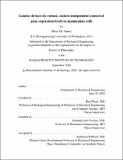Genetic devices for robust, context-independent control of gene expression levels in mammalian cells
Author(s)
Jones, Ross D.
Download1227506549-MIT.pdf (64.89Mb)
Other Contributors
Massachusetts Institute of Technology. Department of Biological Engineering.
Advisor
Ron Weiss and Domitilla Del Vecchio.
Terms of use
Metadata
Show full item recordAbstract
Synthetic biology is an emerging engineering discipline that aims to program living cells with novel and useful functions. Though great progress has been made in the field so far, the development of new gene regulatory systems remains slow and difficult. A major cause of this difficulty is context-dependence of gene expression. In this thesis, we develop synthetic genetic controllers to decouple the behavior of genetic devices from their context in mammalian cells. First, we study the context-dependence caused by competition among genes for shared cellular gene expression resources, finding that overloading such resources pervasively affects the expression levels of engineered genetic devices. We then develop a genetic feedforward controller to decouple gene expression levels from changes in cellular resource availability. We show that this controller is effective at offsetting the effects of resource loading by various resource competitors on gene expression levels across commonly-used cell lines. In addition to resource loading, the feedforward controller also suppresses gene expression noise resulting from cell-to-cell variation in gene delivery. To address limitations of our feedforward controller, we next develop a genetic feedback controller based on protein phosphorylation-dephosphorylation cycles. Compared to the feedforward controller, the feedback controller provides less resistance to resource loading, but affords greater tunability of gene expression levels and enables desensitization to the context-dependence caused by off-target gene regulation. Finally, we develop a control strategy for precisely overwriting the expression level of an endogenous gene, addressing the context-dependence that arises from interactions with natural gene regulation networks and enabling improved eciency in cell fate reprogramming. Overall, the gene expression control strategies developed in this thesis will enable more rapid and predictable development of sophisticated gene regulatory systems that are resistant to their context within mammalian cells.
Description
Thesis: Ph. D., Massachusetts Institute of Technology, Department of Biological Engineering, September, 2020 Cataloged from student-submitted PDF version of thesis. Includes bibliographical references.
Date issued
2020Department
Massachusetts Institute of Technology. Department of Biological EngineeringPublisher
Massachusetts Institute of Technology
Keywords
Biological Engineering.